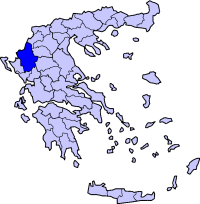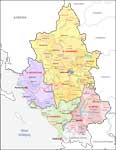|
|
Syrrako or Sirako (Greek: Συρράκο or Σιράκο) is a historical village of Epirus, Greece, population 273 (2001), located 52 km southeast of Ioannina at an altitude of 1200m, on the mountain Peristeri. It is built on a steep slope and represents an example of traditional architecture. Natural and artificial monuments are widely spread. It is the hometown of prominent men (benefactors, politicians, army leaders) and others who succeeded in different fields like literature, arts, politics and trade. The poet and author Kostas Krystallis and the first Prime Minister of Greece, Ioannis Kolettis are included among them. Syrrako is a place where the visitor gets a unique experience caused by the harmonious and respectful connection between the past and the present.
Saint Nicholas church in the central square of Syrrako Location It is built on a steep slope, where the location offers natural shelter and security on the mountain Peristeri (Lakmos), which belongs to the mountain range of Pindus. Pindos, the mythological son of Macedonia’s King, was hated by his brothers but loved by the natives. It was there, where he left his last breath together with his name, after his brothers got his blood on themselves. Syrrako is divided from its twin village Kalarrytes by a deep ravine of unique beauty, where the river Chroussias, a tributary river of Arachthos, flows through. Tradition says that the river’s name derives from Achilleas’ son, Chroussios, who drowned there, not being aware of the fact that water rises fast during bad weather conditions. History Syrrako was inhabited before the 15th century (possibly in the 11th century) by Aromanian speaking Greeks. Different aspects lead to this like the age of the plane trees in the village square. During the Ottoman invasion, after 1480, it was the capital of the self-governed federation of Malakasio, consisting of 42 villages and belonging to Queen Mother (Valide Sultan). Because of this it enjoyed a privileged treatment. During that time the village developed immensely. Firstly, the inhabitants were involved in cattle breeding and afterwards they developed trade, industrial production of wool textiles and cattle products. The expanse of pasture land (nearly 75.000 hectares) enabled the inhabitants to raise the number of sheep and goats to thousands (50.000 and according to others 75.000) and bring the big quantity of their products, in connection with the Syrrakiotes’ trade genius, to the biggest trade centers in the Mediterranean and Black Sea (Italy, France, Spain, Odessa, Moscow, Bucharest, Belgrade, Constantinople and others). The Syrrakiotes’ cape was in great demand and it is said that even Napoleon’s army was supplied with a large number of capes. The foreign travellers William Martin Leake and Pouqueville report in the years 1815 and 1818 that they found in Syrrako “a trade cycle comparable to the best European cities”. Furthermore, they mention the existence of significant libraries and the circulation of European newspapers, evidence that intellectual development co-existed with trade. Syrrako and Kalarrytes were the only villages in Epirus that took part in the first year of the 1821 Revolution with 720 families and 3.500 inhabitants. The Turks destroyed and burnt down the whole village, whereas the inhabitants abandoned it trying to save their lives (10 July 1821). Only five buildings remained untouched and among them Panagia’s church. The inhabitants returned in the year 1825 (according to others in 1827-28), rebuilt the village and between 1860-70 the village became again as imposing as in the previous years. A second revolution had taken place in 1854 which was of no consequence.The decline of wool trade and its replacement by synthetic (1908-10) turned the inhabitants’ trade activities down and forced them to change profession. At that time 530 houses and nearly 5.000 inhabitants existed in the village. The independence came on November 23 1919. In the national census of 1913, Ioannina counts 17.000 inhabitants, Konitsa 2.000 and Syrrako 3.500.
Syrrako Famous natives of Syrrako Syrrako gave Greece important men, who distinguished in different fields and left their name in history. The author and poet Kostas Krystallis (1868-1894) has an important position among them; he wrote “Mountain and Stable”, “Stavraetos”, “Shades of Hades” and “Vlachoi of Pindos” and many others. Ioannis Kolettis (1774-1847) the first Constitutive Prime Minister of Greece (1844-1847), member of Filiki Eteria, Ali-Pasha’s private doctor, minister of the Interior Affairs, of the Navy and Military, member of the “ Three member Committee” after Kapodistria’s death, ambassador in Paris (1844-1847). Georgios Zalokostas (1805-1858) poet and fighter during 1821. The army leaders Katsikogiannis, Lepeniotis and others, the benefactors G. Gianniotis, Sp. Baltatzis, G. Ikkos and many other men of literature, arts and trade.
 |
|
|||||||||||||





